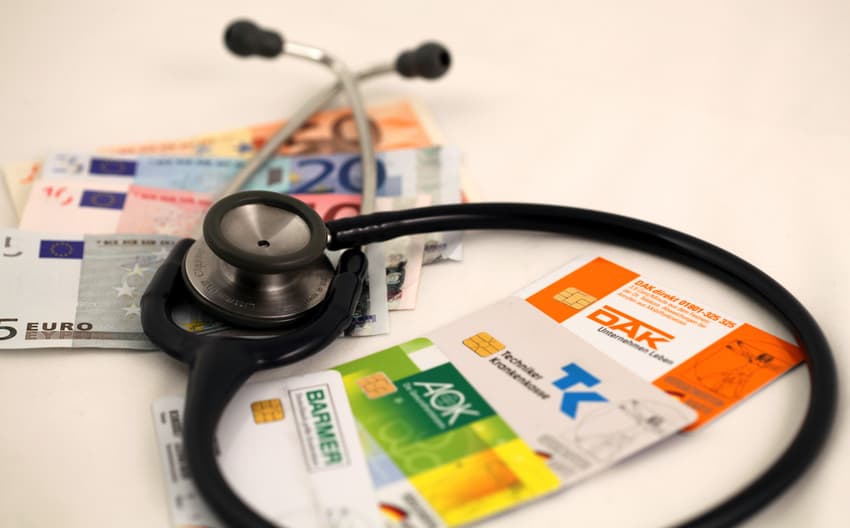Living in Germany: Rising health care costs, (no) customer service and the best comfort food

From people having to fork over more for their health insurance, to the perfect comfort food to get you through this cold spell, here's the latest about life in Germany.
The rising cost of health and care in Germany
Germany’s health system may be world renowned. But one thing is for sure - it’s expensive. And the financial gap has only been getting bigger, as The Local reported this week. As Germany grapples with an ageing and longer-living population and a pandemic that wreaked havoc across hospitals, care homes and society, healthcare costs have shot up.
According to the latest estimates, statutory health insurance organisations like TK and AOK are facing a financial black hole of around €17 billion this year. It’s keeping Health Minister Karl Lauterbach (SPD) busy - and he has set out plans which include allowing these insurance firms to crank up additional contributions (which translates to people paying more) and enforcing pharmaceutical discounts on medicines. Lauterbach is also planning to plough €14.5 billion of treasury funding into the statutory insurers, as well as drawing money from a central health fund and from the insurers' own reserves. However that may not be enough. Lauterbach warned this week that a further increase in health insurance contributions was "almost impossible to avoid".
Meanwhile, the Health Ministry is also planning to increase the cost of long-term care insurance, according to a draft law, to fill a large deficit in the care system.
Monthly contributions could increase by 0.35 percent as of July 1st, 2023. With the cost of living soaring over the last year, planned hikes like these will be unwelcome. But it seems like without a radical reform of the system - which has been proposed by some - there are no other solutions on the table.
Tweet of the week
Those of you who are familiar with a more friendly customer service culture (such as that in the US) will be aware that it’s quite a bit different here in Germany.

Where is this?

Photo: picture alliance/dpa | Bernd Wüstneck
Today we’re hopping over to Graal-müritz on the Baltic Sea coast. Very typical German weather - drizzle, wind and moody skies - didn’t put these beach-goers off a bracing walk this week.
Did you know?
Käsespätzle, a German kind-of mac and cheese, has to be one of Germany’s most-loved cuisines. But do you know where it comes from? Käsespätzle, made from egg noodles mixed with grated cheese and topped with fried onion, is actually a dish that hails from the regions of of Württemberg, Upper Swabia, Baden, Allgäu, Switzerland, Liechtenstein, Tyrol and Vorarlberg.
So it spans four countries - Germany, Austria, Liechtenstein and Switzerland! It’s also known regionally as Chäschnöpfli (Switzerland), Käsknöpfle (Vorarlberg), Kasspatzln (Tyrol) and Kässpätzle/Kässpatzâ/Kässpatzn (Swabia). In Germany’s Swabian regions, Käsespätzle is traditionally prepared with Bergkäse and/or Emmentaler. Make sure you try it in a German restaurant, but be prepared to nap afterwards - it’s quite a heavy dish!
Comments
See Also
The rising cost of health and care in Germany
Germany’s health system may be world renowned. But one thing is for sure - it’s expensive. And the financial gap has only been getting bigger, as The Local reported this week. As Germany grapples with an ageing and longer-living population and a pandemic that wreaked havoc across hospitals, care homes and society, healthcare costs have shot up.
According to the latest estimates, statutory health insurance organisations like TK and AOK are facing a financial black hole of around €17 billion this year. It’s keeping Health Minister Karl Lauterbach (SPD) busy - and he has set out plans which include allowing these insurance firms to crank up additional contributions (which translates to people paying more) and enforcing pharmaceutical discounts on medicines. Lauterbach is also planning to plough €14.5 billion of treasury funding into the statutory insurers, as well as drawing money from a central health fund and from the insurers' own reserves. However that may not be enough. Lauterbach warned this week that a further increase in health insurance contributions was "almost impossible to avoid".
Meanwhile, the Health Ministry is also planning to increase the cost of long-term care insurance, according to a draft law, to fill a large deficit in the care system.
Monthly contributions could increase by 0.35 percent as of July 1st, 2023. With the cost of living soaring over the last year, planned hikes like these will be unwelcome. But it seems like without a radical reform of the system - which has been proposed by some - there are no other solutions on the table.
Tweet of the week
Those of you who are familiar with a more friendly customer service culture (such as that in the US) will be aware that it’s quite a bit different here in Germany.

Where is this?

Today we’re hopping over to Graal-müritz on the Baltic Sea coast. Very typical German weather - drizzle, wind and moody skies - didn’t put these beach-goers off a bracing walk this week.
Did you know?
Käsespätzle, a German kind-of mac and cheese, has to be one of Germany’s most-loved cuisines. But do you know where it comes from? Käsespätzle, made from egg noodles mixed with grated cheese and topped with fried onion, is actually a dish that hails from the regions of of Württemberg, Upper Swabia, Baden, Allgäu, Switzerland, Liechtenstein, Tyrol and Vorarlberg.
So it spans four countries - Germany, Austria, Liechtenstein and Switzerland! It’s also known regionally as Chäschnöpfli (Switzerland), Käsknöpfle (Vorarlberg), Kasspatzln (Tyrol) and Kässpätzle/Kässpatzâ/Kässpatzn (Swabia). In Germany’s Swabian regions, Käsespätzle is traditionally prepared with Bergkäse and/or Emmentaler. Make sure you try it in a German restaurant, but be prepared to nap afterwards - it’s quite a heavy dish!
Join the conversation in our comments section below. Share your own views and experience and if you have a question or suggestion for our journalists then email us at [email protected].
Please keep comments civil, constructive and on topic – and make sure to read our terms of use before getting involved.
Please log in here to leave a comment.